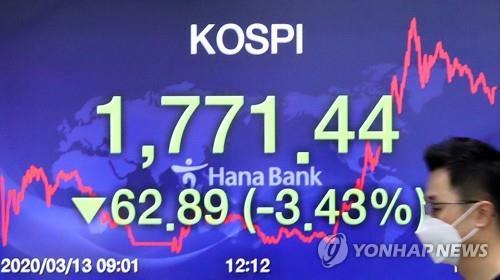South Korean shares suffered a headlong fall Friday, in sync with global peers over the growing fallout from the new coronavirus, but recouped some of the earlier losses to close 3.4 percent down on impending market and economy-supporting measures.
The Korean won finished at a six-month low against the U.S. dollar, after dipping to a 4-year low to the greenback earlier in the day.

The benchmark Korea Composite Stock Price (KOSPI) Index surrendered 62.89 points, or 3.43 percent, to close at 1,771.44. The KOSPI plummeted by slightly over 8 percent to an intraday low of 1,680.60 points.
After the opening bell, the local stock market recorded a nosedive, prompting a brief trading halt on the main KOSPI and the secondary Kosdaq market.
The tech-heavy Kosdaq market also erased earlier losses, ending 7 percent lower at 524.00 points after falling by almost 13 percent.
Trading volume on the main bourse was heavy at 1.02 billion shares worth 13.11 trillion won (US$10.76 billion), with losers far outnumbering gainers 867 to 30.
On Thursday (local time), the Dow Jones Industrial Average, hit by growing uncertainties stemming from the spread of COVID-19, lost around 10 percent to hit 21,200.62 points in its worst daily plunge since 1987. The tech-heavy NASDAQ plummeted 9.4 percent to 7,201.80.
Analysts said the index's erasure of earlier losses was helped by positive news from the United States on the planned stimulus package to cushion the economic impact of COVID-19 outbreak and South Korea's financial authorities' pledge to stabilize the volatile markets.
On Thursday (local time), U.S. House of Representatives Speaker Nancy Pelosi said lawmakers and the White House had neared an agreement on a stimulus package and hope to make an announcement on Friday.
"The comment definitely gave a boost to investor sentiment in global equity markets," Noh Dong-kil, an analyst at NH Investment & Securities Co., said over the phone.
In response to three consecutive sessions of free-fall, Finance Minister Hong Nam-ki and Bank of Korea Governor Lee Ju-yeol agreed to implement policies to weather the current market volatility as well as support the virus-hit economy.
The central bank said earlier in the day that it also mulls an option to hold a meeting for a potential rate cut. The Ministry of Economy and Finance warned that it would intervene into the currency market to stem fluctuations.
"We are planning to actively use policy measures to stabilize the financial market as the volatility in the local financial and foreign exchange markets is expanding due to the impact from the spread of COVID-19," the BOK said after an emergency meeting.
On Friday afternoon, the Financial Services Commission (FSC) announced a six-month ban on short selling for all listed stocks starting Monday. The FSC said the duration of the ban can be extended depending on market conditions.
Foreigners continued to sell stocks after dumping 4.6 trillion won worth of stocks in the past six sessions. They sold a net 1.24 trillion won worth of stocks Friday alone, while institutions and individuals purchased stocks valued at 1.11 trillion won.
The KOSPI plunge came as investors assessed that the U.S. ban on travel from Europe and the planned coronavirus stimulus package won't be enough to counter the virus' impact on the economy.
In an address to the nation Wednesday (local time), U.S. President Donald Trump made a shock announcement on banning travel from Europe, except for Britain, for 30 days, while not providing a detailed U.S. economic rescue package.
Further weighing on investor sentiment is the World Health Organization's declaration of the coronavirus as a pandemic.
The main index already plunged 6.6 percent in the past two sessions amid concerns that the spread of the coronavirus may end up in a much-dreaded recession.
"Investors will remain cautious until the U.S. comes up with concrete relief measures to counter the virus' economic impact," Noh said.
Most large-cap stocks declined.
Market bellwether Samsung Electronics Co. fell 1.7 percent to 49,650 won, No. 2 chipmaker SK hynix Inc. declined 0.4 percent to 82,500 won, top carmaker Hyundai Motor Co. shed 8.2 percent to 87,200 won, and leading steelmaker POSCO shed 3.9 percent at 171,000 won.
Among decliners, state-run utility Korea Electric Power Corp. fell 4.9 percent to 19,550 won, national flag carrier Korean Air Lines Co. shed 5.1 percent to hit 20,600 won, and leading refiner SK Innovation Co. was down 6.4 percent at 86,500 won.
The local currency closed at 1,219.30 won against the U.S. dollar, down 12.80 won from the previous session's close.
"The pace of the won's plunge against the greenback slowed down as global risk-off sentiment eased and on the financial authorities' intention to intervene into the markets," Samsung Futures strategist Jeon Seung-ji said.
The local debt market also suffered a loss. Bond prices, which move inversely to yields, ended lower. The yield on three-year Treasurys jumped 8.7 basis points to 1.149 percent, and the return on the benchmark five-year government bond climbed 12.7 basis point to 1.314 percent. (Yonhap)

